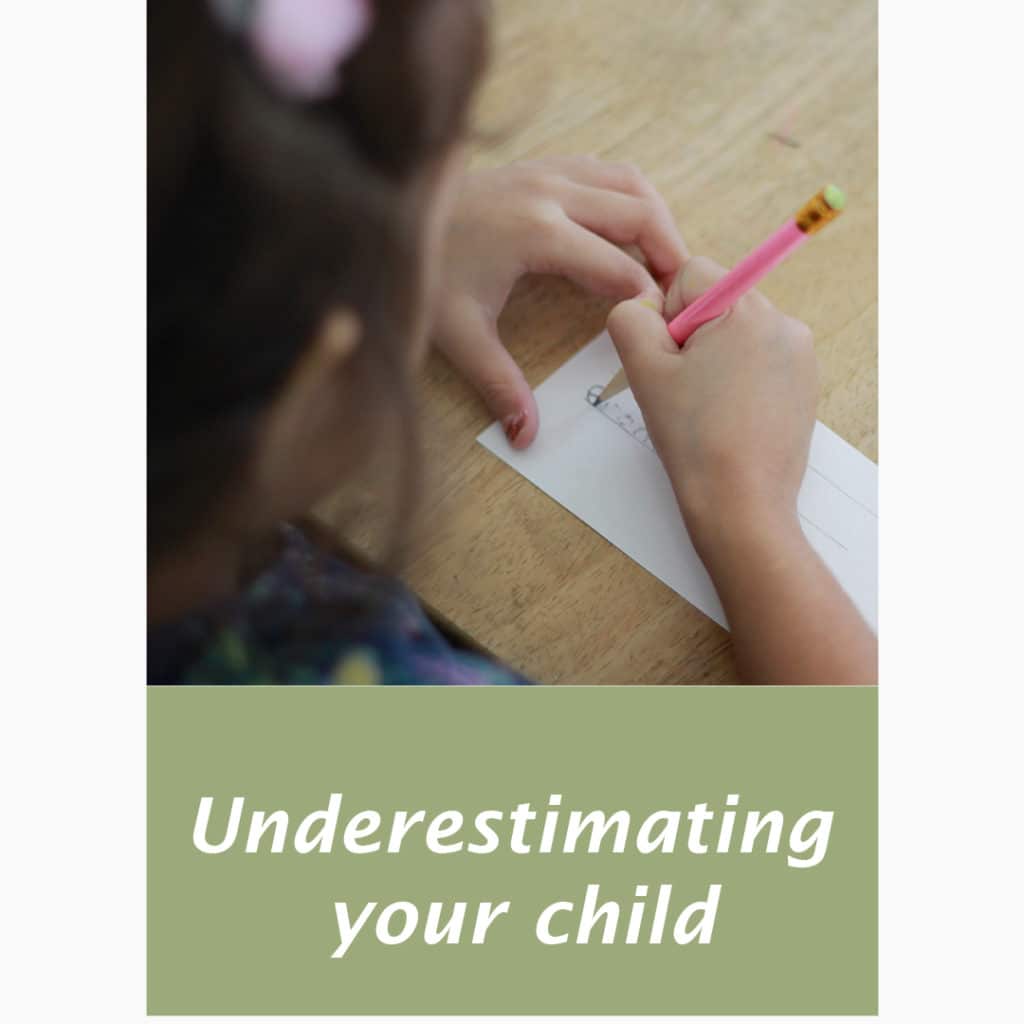Underestimating your child

Wherever I look these days I see articles and commentators making a big thing about not pushing children and that they should be free to enjoy their childhood rather than being thrown into formal learning. I couldn’t agree more, however, it is a shame that so many of these arguments and articles are so narrow minded about what constitutes pushing. It’s part of my job to stay up to date with educational research and every day I read an article about how children are being pushed too hard and I browse comments from people that have read the latest parenting magazine and blindly repeat its mantra that children shouldn’t be in school until they are six or seven. For the most part it is people that want to sound like they are ahead of the research and know everything there is to know about education. Everyone has a say on this subject, from parents and teachers to policy makers and even celebrities. People are so quick to jump on the bandwagon, trying to make themselves sound new age, that at times they forget about what they are actually arguing about. I understand this is a quite controversial issue and it sounds like I am bucking the trend so to speak but bare with me and take a look at what I have to say.
Firstly, to clarify, it is absolutely NOT okay to push children against their will. That is not the argument that I am making. What I am saying is that we need to differentiate between what is pushing and what is effective learning. This is something that we at BEYC have based our whole philosophy around. Forcing a child of three years old to finish handwriting is not going to help anyone and in this scenario all of those articles are absolutely spot on. However what if the child actually wants to learn? What is the difference between formal education and educating a child to catch a ball or build a spaceship out of lego? And here in lies the point I am making. Children are learning from birth and in fact they are even learning in the womb. When a parent gets cross at a child for not picking up their toys, are we not educating? When we teach a child to eat for themselves or tie a shoelace are we not educating? There are two main differences between this type of learning and formal schools: 1) It is fun to play with lego 2) The boring bits like tying laces are in small manageable doses. So what if we could take this idea of learning and replicate it in schools? What if we could make learning fun so that the children actually wanted to be there and we made the boring bits so short that the children didn’t even remember them?
https://www.youtube.com/watch?v=GOnkKImB2A0
Are the children here being pushed or are they actively having fun? The articles that moan that children are learning too early or are being pushed too soon are so focused on age and traditional school teaching that they forget to take into account the type of learning on offer. Granted it is difficult to find schools that do make it all fun for the children as you always have teachers and school systems that aren’t up to the challenge, but when choosing a school for your child and wondering whether it is too early or not, remember that it is never too early if you have the right kind of environment. All the activities at BEYC are fun and it makes teaching and learning so much more enjoyable and so much easier. There are slower moments where you need the children to concentrate but these are fleeting and when the children have had enough we don’t force the issue, we move on, even if that means scrapping the whole lesson. How does it work out? Well take a look at our results. This was a video taken at the start of Year 1.
Another kind of magazine article I always see discusses milestones for children. Yes these are useful to some extent, but what is ironic is that these maazines are the same ones posting about how we shouldn’t push our children. So what is it to be? Push the child to meet the milestones or pushing children is harmful? Children all develop at different paces. Setting targets for them so early is damaging, not just for the slower developers but also the higher ones as you begin to hold them back, rationalising that they are already well ahead. But what exactly are they well ahead of? The average child or the goals and stigmas that we ave attached to the average child? That child might want to grow up to be an astronaut or a world famous composer. That might be their drive and they might enjoy learning and the challenges that come with it; only we held them back as we thought they were doing fine. In fact the only time these charts have relevance are if you suspect that the child has learning difficulties and that they are way behind in certain areas, but even then, is the chart really necessary?
The main point that I am making is that YES you are all correct, pushing children is wrong. You will no doubt push a child into boredom and give them a negative attitude to study, but pushing a child with their consent by making things fun will give them an amazing start in life; one which they will thank you for. Don’t get caught up in the bandwagon advertising of these articles. Step back and think about learning in a different light.
